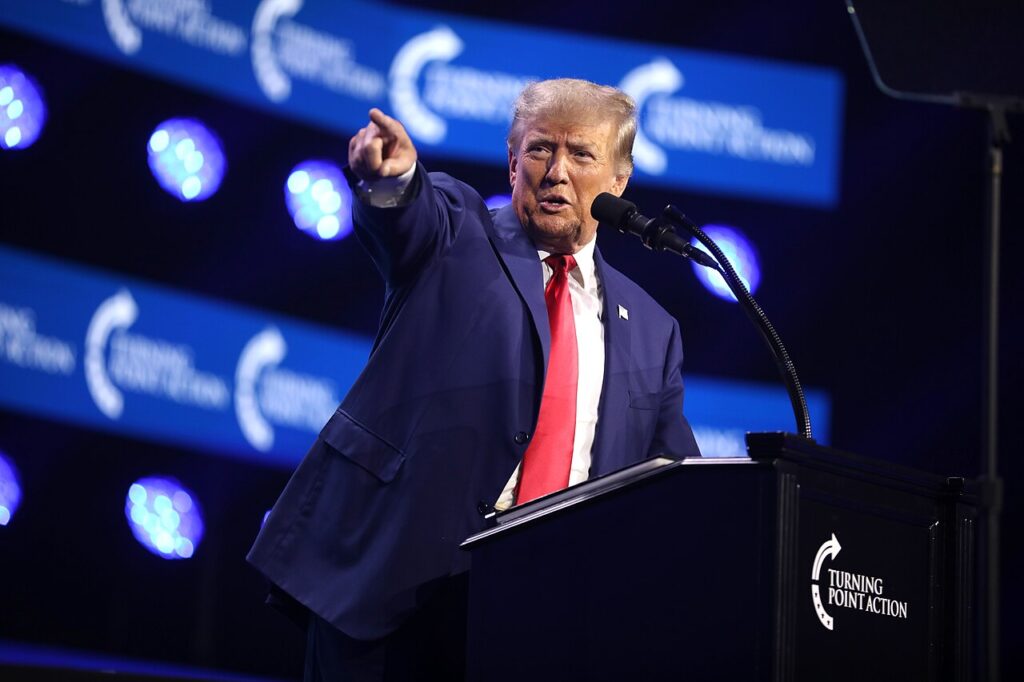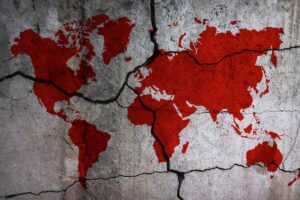The Red cell project
The Red Cell was a small unit created by the CIA after 9/11 to ensure the analytic failure of missing the attacks would never be repeated. It produced short briefs intended to spur out-of-the-box thinking on flawed assumptions and misperceptions about the world, encouraging alternative policy thinking. At another pivotal time of increasing uncertainty, this project is intended as an open-source version, using a similar format to question outmoded mental maps and “strategic empathy” to discern the motives and constraints of other global actors, enhancing the possibility of more effective strategies.
The Wounds of American Democracy Become Fatal
Former President Donald Trump is not the source, but rather a symptom of public disaffection with the U.S. federal government and its policies, including on international affairs. Many MAGA Republicans in the GOP base are drawn from the Rust Belt — small towns and rural areas — and see themselves as losers from past decades of outsourcing and globalization. The Republican/Democratic split is economic and increasingly cultural, even more so than it is about race or ethnicity. A look at the national map of the 2020 voting results shows seas of red [Republican] counties surrounding clusters of blue [Democratic] ones.
The economy has been working well in the Democratic counties — but not so much in the “red“ Republican ones. Furthermore, inflation has been particularly hard on people with middle and low incomes, including the bulk of the Republican base. Trump is a master at stirring up public resentment against the heavily Democratic political establishment and the so-called “deep state.” His enormous popularity with the GOP base has transformed the party to the point where even his rivals do not so much depart from his positions as try to outdo him, such as Florida Gov. Ron DeSantis‘ assaults on “wokeism” that have even drawn Trump’s criticism. This politics of loss and resentment fundamentally calls into question the continued existence of American democracy — irrespective of Trump. The more the political elite fumes over his continued success, the more enthusiastically Trump’s supporters celebrate the former President.
Trump and the Republicans are helped in their fight to reclaim the White House by the fact that three-quarters of the public, including a sizeable portion of Democrats, think President Joe Biden is too old to effectively serve a second term. Biden’s support could further weaken if he follows through on his advisers’ plans for a Rose Garden re-election strategy of sunny White House ceremonies, surgical sorties to swing states, and a busy international travel schedule. This is a risky battle plan against an energetic (despite his 77 years) populist rabble-rouser like Trump.
Opportunities and Dangers with Trump
During his 2016-2020 term, Trump proved as much a pragmatist as he did an ideologue on foreign policy. As his negotiations with North Korean leader Kim Jong Un illustrated, Trump did not care whether he talked with dictators or despots, as long as doing so served what he saw as vital U.S. interests. Such an approach would open new channels of communication with Moscow and even Beijing. Needless to say, potentially finding areas of agreement, as Moscow and Beijing anticipate, could have downsides with Kyiv and Taipei. Ending the fighting in the Ukraine case, however, or lowering the tensions over Taiwan could prove to be beneficial as long as they lead to a more permanent and just peace in those two volatile situations.
On Russia
Russia’s war in Ukraine has turned into a battle of attrition in the second year, with the risk that neither side will gain or lose much territory, and the possibility for the conflict to drag on for the foreseeable future. The former Chairman of the Joint Chief of Staff Mark Milley warned already that the Ukrainian effort will be “very bloody, slow, long and difficult.”
Any conflict that drags on beyond an initial year has a high probability of turning into an extended one, including a frozen conflict. Although Russia’s use of tactical nuclear weapons might be less likely in a war of attrition, especially when Russia’s possession of Crimea is not threatened, many Republican lawmakers and much of the U.S. public are already tiring of supporting Ukraine’s military efforts. They see the money going to Kyiv as a drain on resources that could be better spent at home. Trump has praised Russian President Vladimir Putin’s invasion as “genius,” while repeatedly vowing to end “this ridiculous war,” conceding that doing so could mean that Ukraine will need to give up some of its territory. In his words, “I think the biggest thing that the U.S. should be doing right now is making peace — getting Russia and Ukraine together and making peace.”
Particularly if Republicans keep the House and win the Senate, another Trump presidency could turn the tide on American support for Ukraine. Trump could get Putin to come to the table but Ukrainian President Volodymyr Zelenskyy would have to be willing to compromise on his maximalist demands for more than a temporary cease-fire to occur. Of course, there are benefits to ending the fighting, which is causing mounting casualties on both sides and catastrophic damage to Ukrainian infrastructure and the country’s ability to easily recover. A Trump administration could not lift all U.S. sanctions on Russia without congressional approval. And hawks within the Republican party would most likely resist doing anything more than helping to end the fighting.
Europe would be put into a quandary. On the one hand, a cessation of the fighting would be welcome because the European public is also beginning to tire of the war, and the radical right favorable to Putin has grown significantly in different European states. On the other hand, any quick solution is unlikely to last. Not only will Zelenskyy and the Ukrainian public feel aggrieved and want to regain the country’s lost territory, but Putin could also see advantages in reopening the conflict, particularly to keep Ukraine out of NATO.
If European capitals outright oppose Trump, NATO could split, with the risk of the institution failing altogether and increased doubts about U.S. backing for European security. For some time, many Republicans, not just Trump, have seen Europe as a freeloader, relying on the United States for its security and shouldering less than its fair share of the defense burden. Any break over Trump’s dealing with Putin could deepen resentment on both sides and lead to an irreparable rupture. If Trump is reelected, understanding his intentions early and gaining his ear will be critical for European leaders to mitigate the risks of a breakdown in ties. Rebuilding a democratic and economically thriving Ukraine might be the best revenge against Russia, and Europe will need to be on the leading edge of any reconstruction because the United States is unlikely to provide any sort of Marshall Plan for Ukraine under Trump.
Continuity, but Possibly No War with China
Although Biden has adopted many features of Trump’s foreign policy — notably, anti-China fervor and protectionism — Chinese officials have told analysts that they hope Trump is reelected. This is despite the fact that the former President has already pledged to revoke Beijing’s “most-favored-nation” trade status, which would raise tariffs on some half-trillion dollars’ worth of goods imported from the country annually. “My agenda will tax China to build up America,” Trump has said repeatedly, even though the tariffs he raised during his presidency have been shown to increase costs on Americans.
On Taiwan, Trump has hinted in an interview that he would not decide to defend the island against a Chinese invasion, criticizing the country for having stolen its thriving semiconductor business from the United States. When pressed to explain his position, Trump said he would not disclose more to avoid undermining any negotiations he intends to conduct with China. Beijing on the other hand sees Trump as more interested in a “deal” to settle differences and less able to rally allies and partners than the current Biden Administration. The former president has also never demonstrated any passion for human rights or preaching democracy.
US Leadership on Climate Change Will Falter
Trump has a strong anti-climate record, having eliminated over 100 environmental regulations while in office, in addition to pulling the United States out of the Paris Climate Accords. He would most likely do so again, but it is unclear what his positions would be on Biden’s signature acts of legislation, the Inflation Reduction Act (IRA) and the CHIPS Act, both of which seek to stimulate domestic industries, many linked to green energy. Republicans have traditionally opposed government interference in the private sector, but Trump as president called for building up a semiconductor manufacturing industry at home, which the Biden administration aims to achieve, too. Moreover, many of the new IRA- and CHIPS-funded facilities are being constructed in “red” Republican states. Consequently, congressional Republicans are now split, recently failing to repeal a set of tax credits for clean energy that were part of the IRA legislation due to opposition from Iowa’s GOP representatives. That state is a mega-beneficiary from the federal incentives for biofuels.
Funding these programs, however, will be increasingly costly for the federal government, which is already saddled with a historic peacetime debt. The crunch point will most likely come early in the next presidency, no matter who is in the White House when Trump’s first-term tax cuts for the wealthy must be renewed or modified. One reason the former President is proposing increasing tariffs on Chinese goods is that he will need more revenue to avoid having to reverse his earlier, signature tax cuts.
Make or Break for Europe
Already, in the last election, a gap opened “between the nationalistic doctrine favored by Trump and the more traditional, collaborative strategy espoused by Democratic nominee Joe Biden.” In its most recent comprehensive survey done in October 2022, the well-regarded Chicago Council on Global Affairs polling noted that “Republican support for maintaining an active part in world affairs is at 55%, the lowest in the history of the survey since 1974” (when the Vietnam War was raging and shortly after the start of the oil crisis). Democratic support for a more activist U.S. posture remains well above that of Republicans, but Democrats’ support for an active role has also declined from its peak of 78% two years ago — to 68%. Consequently, with members of both parties retrenching, “overall support for an active U.S. role in world affairs has declined to 60% among all Americans — the lowest since 2014.”
Whether it is the Ukraine conflict, China, or future transatlantic relations, Trump’s economic nationalism and foreign policy restraint are certainly challenges for Europe, but could also prove to be opportunities. Decision-makers in Brussels and other European capitals will have to settle their disputes and start employing some realpolitik if they do not want to be the biggest losers from a Trump 2.0 world. The most immediate threat would be in the security realm, especially if Trump abruptly turns his back on NATO, leaving Europe more vulnerable to Moscow’s aggression. More likely, however, pulling out of NATO will be a slow process even if the writing is on the wall. Europeans could hope that a more friendly Democratic or traditionalist Republican administration returns after Trump leaves office, but over time, they should probably prepare for a United States that has turned its focus to Asia and increasingly expects Europe to provide for most of its security.
The Red Cell thanks the Swedish Defence University for its support in the research and writing of this article.




